293. The first star at the stern
of Argo Navis was the great Canopus (the Steersman,
the Pilot)
.jpg)
and from St John's Day (June 24,
when Father Light was burned alive)
... Midsummer is the
flowering season of the oak, which is the tree of endurance and triumph,
and like the ash is said to 'court the lightning flash'. Its roots are
believed to extend as deep underground as its branches rise in the air -
Virgil mentions this - which makes it emblematic of a god whose law runs
both in Heaven and in the Underworld ... The month, which takes its name
from Juppiter the oak-god, begins on June 10th and ends of July 7th.
Midway comes St. John's Day, June 24th, the day on which the oak-king
was sacrificially burned alive. The Celtic year was divided into two
halves with the second half beginning in July, apparently after a
seven-day wake, or funeral feast, in the oak-king's honour ...
up to
and including Ga2-27 there were 59 - 32 = 27 right
ascension days. And from Rei in Ga1-30 up
to and including Rei in Ga2-27 there
were 57 - 29 days = 4 weeks:
|
APRIL 17 (80 + 27) |
18 (108) |
19 (*29) |
20 |
21 (84 + 27 = 111) |
 |
 |
 |
 |
 |
|
Ga1-27 |
Ga1-28 |
Ga1-29 |
Ga1-30 |
(33)
Ga2-1 (32) |
|
6h (91.3)
ν Orionis
(91.4),
θ Columbae (91.5), π Columbae
(91.6) |
ξ Orionis
(92.5) |
Al Han'ah-4 (Brand) /
Maru-sha-pu-u-mash-mashu-7
(Front of the Mouth of the
Twins)
TEJAT PRIOR = η Gemini
(93.4),
γ Monocerotis (93.5), κ Aurigae
(93.6), κ Columbae (93.8) |
FURUD
= ζ Canis Majoris
(94.9) |
Well-22 (Tapir) /
Arkū-sha-pu-u-mash-mashu-8
(Back of the Mouth of the Twins)
δ Columbae (95.2),
TEJAT POSTERIOR = μ Gemini,
MIRZAM (Roarer) = β Canis
Majoris
(95.4),
CANOPUS
= α Carinae
(95.6), ε Monocerotis (95.7), ψ1
Aurigae (95.9) |
|
... Murzim [β
Canis Majoris], generally but
less correctly Mirzam,
and occasionally Mirza,
is from Al Murzim, the
Announcer˛, often combined by
the Arabs with
β
Canis Minoris in the plural
Al Mirzamāni, or as Al
Mirzamā al Shi'rayain,
the two Sirian Announcers;
Ideler's idea of the
applicability of this title
being that this star announced
the immediate rising of the
still brighter Sirius. ˛
Literally the Roarer, and so
another of the many words in the
Arabic tongue for the lion, of
which that people boasted of
having four hundred ... |
|
June 20 |
SOLSTICE |
22 (*93) |
23 (174) |
ST JOHN'S DAY |
|
°June 16 |
17 (168) |
18 |
19 |
20 (*91) |
|
'May 24 (*64 = *50 + *14) |
25 |
26 |
27 |
28 (*68) |
|
"May 10 (*91.4 - *41.4) |
11 |
12 (*93.4 - *41.4 = *52) |
13 |
14 (*54 = *95.4 - *41.4) |
|
CLOSE TO THE FULL MOON: |
|
OCT 17 (290) |
18 |
19 |
20 |
21 (*214) |
|
... She planted her potatoes 7
in a row, placing her foot in
front of her as a measure from
one potato to the next. Then she
marked the place with a bean -
which would also give
nourishment to the surrounding
potatoes. Next she changed
variety and planted 7 more
followed by another bean, and
this was the pattern she
followed until all her 214
varieties had been put down in
their proper places. She had
drawn a map which she followed
and from where each sort of
potato could be located at the
proper time for its harvest. I
was fashinated, when I happened
to stumble on this Swedish TV
program, because my 'once upon a
time' was now and 214 (= 2 *
107) was surely no coincidence.
She knew what she was doing.
Let's therefore count: 214 * 7
(potatoes) + 213 (beans) = 1711.
So what? Probably because 1711 =
59 * 29 ...
... The Hawaiian woman who was
interviewed chuckled because the
assassination of Captain Cook
coincided with the day we have
named All Hearts' Day -
when in February 14 (2-14) the
war-god Kuu returned to
power. The assassination of
Julius Caesar came a month (29
days) later (and 365 - 29 = 336
= 14 * 24 = 12 * 28) ... |
|
ZHŌNGSHĀN = ο Herculis
(274.0), π Pavonis (274.6) |
ι
Pavonis (275.1),
POLIS
= μ Sagittarii
(275.9)
MENKAR (α Ceti)
|
η Sagittarii
(276.9) |
Purva Ashadha-20 (Winnowing
Basket) |
|
KAUS AUSTRALIS =
Ε(lsie)
Sagittarii
,
κ Lyrae (277.5),
TUNG HAE (Heavenly Eastern Sea)
= η Serpentis
(277.7),
SHAOU PIH (Minor Minister) = φ
Draconis
(277.8),
KWEI SHE = χ Draconis
(277.9) |
φ
Oct. (278.1),
KAUS BOREALIS = Λ(acie)
Sagittarii
(278.3), ξ Pavonis (278.4),
AL ATHFAR
(The Talons of the Falling
Eagle)
= μ Lyrae
(278.6) |
|
... 'Tell us a story!' said the
March Hare. 'Yes, please do!'
pleaded Alice. 'And be quick
about it', added the Hatter, 'or
you'll be asleep again before
it's done.' 'Once upon a time
there were three little
sisters', the Dormouse began in
a great hurry: 'and their names
were Elsie, Lacie, and Tillie;
and they lived at the bottom
of
a well — '
.jpg)
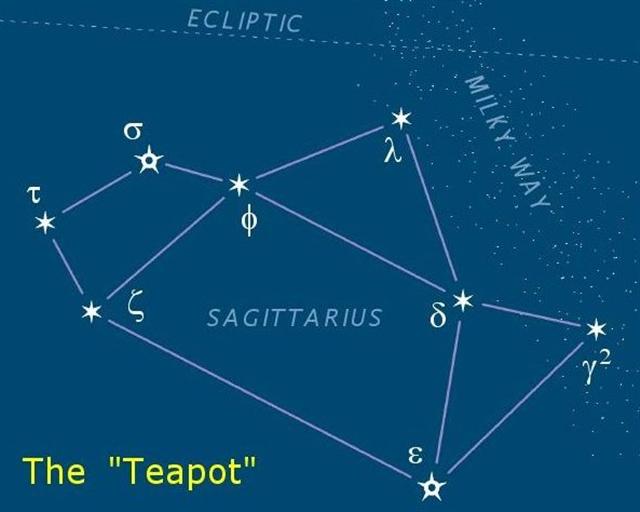 |
|
Dec 20 (354) |
SOLSTICE |
22 |
23 (*236 + *41) |
CHRISTMAS EVE |
|
°Dec 16 |
17 |
18 |
19 (*273 = 236 + 37) |
20 (354) |
|
'Nov 23 (327) |
24 |
25 |
26 (*250 = 236 + 14) |
27 |
|
"Nov 9 |
10 (314) |
11 |
(*236 = 8 * 29˝) |
13 |
|
... As has already been
mentioned, the Delphians
worshipped Dionysus once a year
as the new-born child,
Liknites, 'the Child in the
Harvest Basket', which was a
shovel-shaped basket of rush and
osier used as a harvest basket,
a cradle, a manger, and a
winnowing-fan for tossing the
grain up into the air against
the wind, to separate it from
the chaff. The worship of the
Divine Child was established in
Minoan Crete, its most famous
early home in Europe. In 1903,
on the site of the temple of
Dictaean Zeues - the Zeus who
was yearly born in Rhea's cave
at Dicte near Cnossos, where
Pythagoras spent 'thrice nine
hallowed days' [27] of his
initiation - was found a Greek
hymn which seems to preserve the
original Minoan formula in which
the gypsum-powdered,
sword-dancing Curetes, or
tutors, saluted the Child at his
birthday feast. In it he is
hailed as 'the Cronian one' who
comes yearly to Dicte mounted on
a sow and escorted by a
spirit-throng, and begged for
peace and plenty as a reward for
their joyful leaps ...
 |
|
23 |
 |
 |
 |
 |
 |
|
Ga2-25 |
Ga2-26 |
Ga2-27
→ π |
(59)
Ga2-28 (58) |
(60)
Ga2-29 (59) |

... The Pythagoreans make Phaeton
fall into Eridanus, burning part of its
water, and glowing still at the time when
the Argonauts passed by. Ovid stated that
since the fall the Nile hides its sources.
Rigveda 9.73.3 says that the Great Varuna
has hidden the ocean. The Mahabharata tells
in its own style why the 'heavenly Ganga'
had to be brought down. At the end of the
Golden Age (Krita Yuga) a class of
Asura who had fought against the 'gods'
hid themselves in the ocean where the gods
could not reach them, and planned to
overthrow the government. So the gods
implored Agastya (Canopus, alpha
Carinae = Eridu) for help. The great Rishi
did as he was bidden, drank up the water of
the ocean, and thus laid bare the enemies,
who were then slain by the gods. But now,
there was no ocean anymore! Implored by the
gods to fill the sea again, the Holy One
replied: 'That water in sooth hath been
digested by me. Some other expedient,
therefore, must be thought of by you, if ye
desire to make endeavour to fill the ocean
...
The Lion
(Canopus) was an aspect of the
true Sun while the Antelope
(Sirius) who followed 6 days
later was a false Sun - only his
image in a Smoking Mirror Wall.
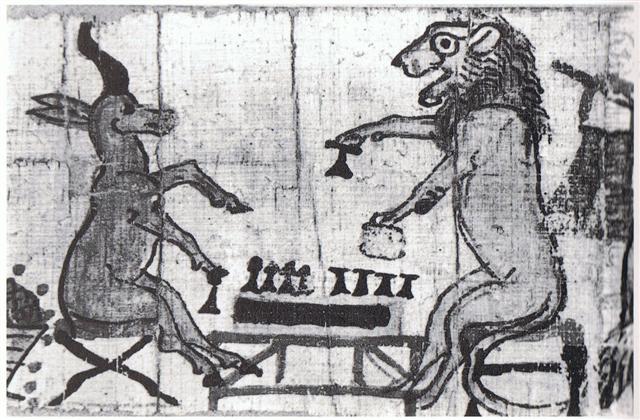
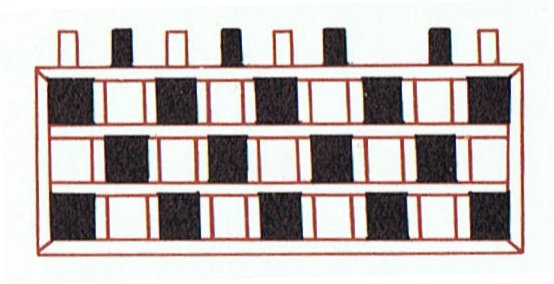
... Some connect
the sign [Capricornus] in
Egyptian astronomy with Chnum,
Chnemu, Gnoum, or
Knum, the God of the
Waters, associated with the
rising of the Nile and worshiped
in Elephantine at the Cataracts,
this divinity bearing goat's,
not ram's, horns.
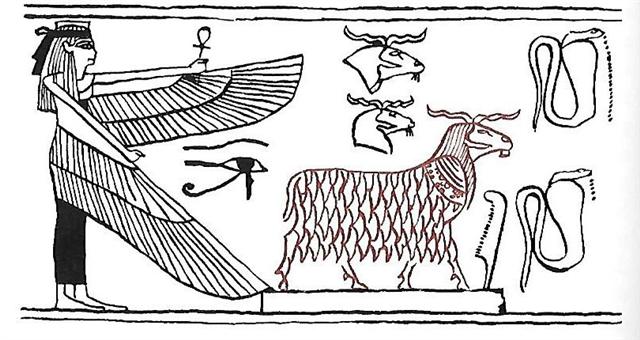
Others have said
that it was the goat-god
Mendes; and La Lande cited
the strange title Oxirinque
from the Greek adjective of a
Swordfish, our constellation
sometimes being thus shown, when
it was considered the cause of
the inundation. In Coptic Egypt
it was Όπέυτυσ,
Brachium Sacrificii; and
Miss Clerke says that it was
figured in that country as a
Mirror, emblematic of life
...
"Early Hindu
names were Mriga and
Makara, - the Cingalese
Makra and the Tamil
Makaram, an Antelope ..."
(Allen)
... But
the time of his predestined defeat by the
dark brother, Tezcatlipoca,
was ever approaching, and, knowing perfectly
the rhythm of his own destiny,
Quetzalcoatl would
make no move to stay it.
Tezcatlipoca,
therefore, said to his attendants, 'We shall
give him a drink to dull his reason and show
him his own face in a mirror; then, surely,
he will be lost'. And he said to the
servants of the good king, 'Go tell your
master that I have come to show him his own
flesh!' But when the message was brought to
Quetzalcoatl,
the aging monarch said, 'What does he call
my own flesh? Go and ask!'
And when the other was
admitted to his presence: 'What is this, my
flesh, that you would show me?'
Tezcatlipoca
answered, 'My Lord and Priest, look now at
your flesh; know yourself; see yourself as
you are seen by others!' And he presented
the mirror. Whereupon, seeing his own face
in that mirror, Quetzalcoatl
immediately cried out, 'How is it possible
that my subjects should look upon me without
fright? Well might they flee from before me.
For how can a man remain among them when he
is filled as I am with foul sores, his old
face wrinkled and of an aspect so loathsome?
I shall be seen no more, I shall no longer
terrify my people' ...
|
... And here is the dawning and
showing of the sun, moon, and
stars. And Jaguar Quitze, Jaguar
Night, Not Right Now, and Dark
Jaguar were overjoyed when they
saw the sun carrier. It came up
first. It looked brilliant when
it came up, since it was ahead
of the sun.
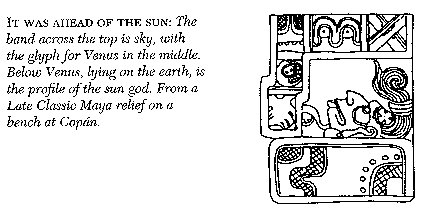
After that they unwrapped their
copal incense, which came from
the east, and there was triumph
in their hearts when they
unwrapped it. They gave their
heartfelt thanks with three
kinds at once:
Mixtam Copal is the name of the
copal brought by Jaguar Quitze.
Cauiztan Copal, next, is the
name of the copal brought by
Jaguar Night.
Godly Copal, as the next one is
called, was brought by Not Right
Now.
The three of them had their
copal, and this is what they
burned as they incensed the
direction of the rising sun.
They were crying sweetly as they
shook their burning copal, the
precious copal. After that they
cried because they had yet to
see and yet to witness the birth
of the sun. And then, when the
sun came up, the animals, small
and great, were happy. They all
came up from the rivers and
canyons; they waited on all the
mountain peaks. Together they
looked toward the place where
the sun came out.
So then the puma and jaguar
cried out, but the first to cry
out was a bird, the parrot by
name. All the animals were truly
happy. The eagle, the white
vulture, small birds, great
birds spread their wings, and
the penitents and sacrificers
knelt down. They were overjoyed,
together with the penitents and
sacrificers of the Tams, the
Ilocs. And the Rabinals,
Cakchiquels, those of Bird
House. And the Sweatbath House,
Talk House, Quiba House, those
of Yokes House. And the Mexican
Sovereigns - however many tribes
there may be today. There were
countless peoples, but there was
just one dawn for all tribes.
And then the face of the earth
was dried out by the sun. The
sun was like a person when he
revealed himself. His face was
hot, so he dried out the face of
the earth. Before the sun came
up it was soggy, and the face of
the earth was muddy before the
sun came up. And when the sun
had risen just a short distance
he was like a person, and his
heat was unbearable.
Since he revealed himself only
when he was born, it is only his
reflection that now remains. As
they put it in the ancient text,
'The visible sun is not the real
one ... '
(Dennis Tedlock , Popol Vuh.
The Mayan Book of the Dawn of
Life.)
... What might lie behind this
statement is revealed by a
contemporary Mopán Maya tale in
which Lord K'in (the sun)
goes from his home in the east
to the center of the sky and
then back to the east again; it
appears that he goes clear
across the sky because he has
placed a mirror at its center.
To interpret the movements of
the sun in this manner is to
model it on Venus as morning
star, which both rises and sets
in the east ...
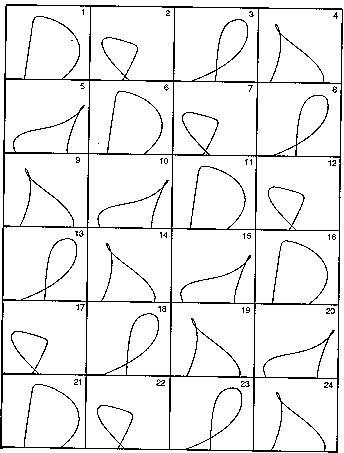 |
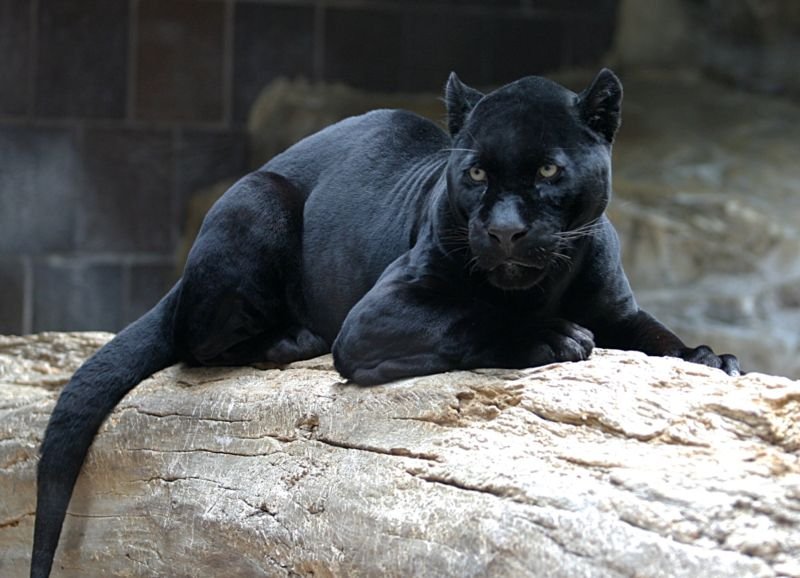
|
.jpg)


.jpg)








